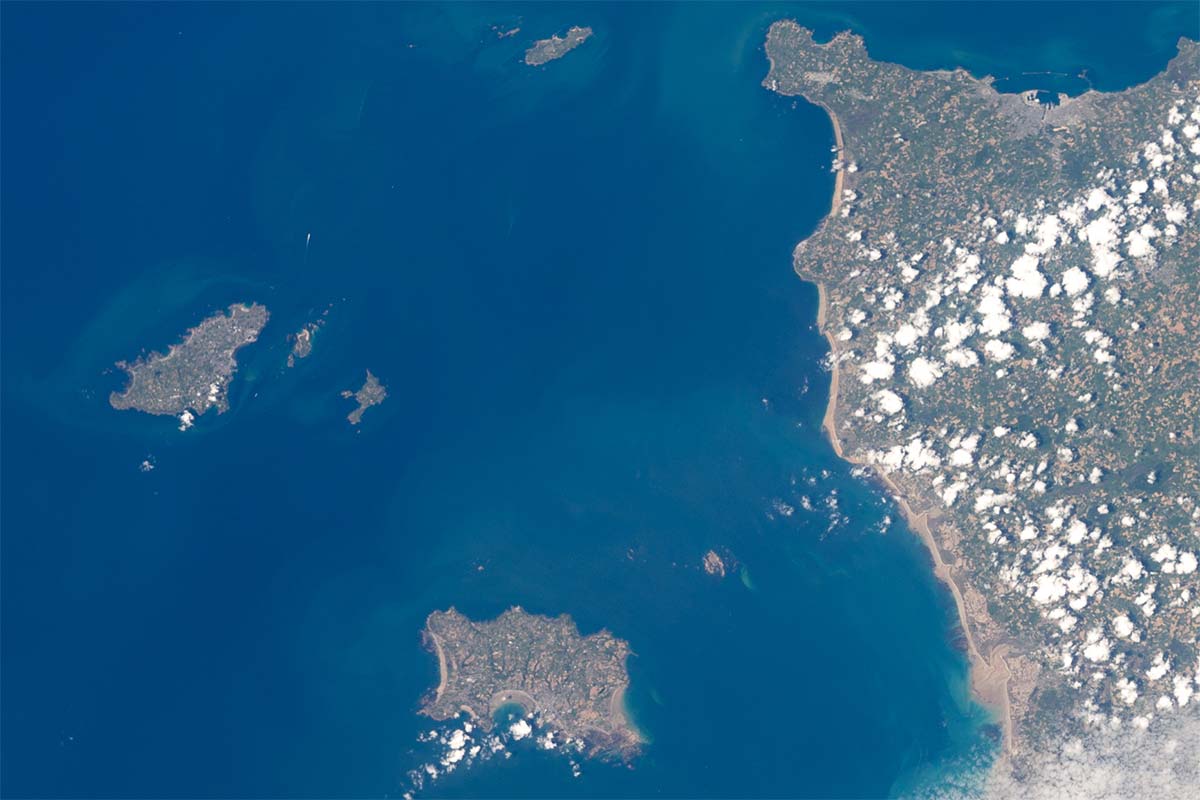Channel Islands

There are 19 Channel Islands in all, split between the Bailiwicks of Guernsey and Jersey. While Jersey is the largest island of them all, the Bailiwick of Guernsey consists of the largest number of separate landmasses, each allied to its own main island.
Bailiwick of Guernsey
Consists of islands that fall under the jurisdiction of Guernsey. They are organised into three groups around Guernsey, Alderney and Sark respectively.
The islands of Alderney
- Alderney
- Ortac
- Burhou
- Les Casquets
Bailiwick of Jersey
Collection of islands that fall under the jurisdiction of Jersey.
The islands of Jersey
- Jersey
- Les Ecrehous
- La Motte
- Les Minquiers
- Pierres de Lecq
- Les Dirouilles
A bailiwick is a jurisdictional area — in this case each collection of islands — overseen by a bailiff. The bailiff performs a number of functions, including speaker (presiding officer of the bailiwick parliament — the States of Deliberation in the case of Guernsey and the States of Jersey Assembley on Jersey — and presides at the main courts — the Royal Court of Guernsey and the Royal Court of Jersey.

Governance
Guernsey is governed by its own parliament, the States of Deliberation, all of whose laws apply to Herm, and many of which are also applicable to Alderney and Sark. It is made up of 45 deputies, elected every four years, plus two other appointed by the reigning monarch — the Procurer, who acts as Attorney General, and the Comptroller, who is the Solicitor General.
None of the elected deputies are members of a political party, and they are split into ten departments to service various aspects of life on the islands.
The 11-member States of Alderney also sends two members to sit within the States of Deliberation in Guernsey so that they can represent the interests of their own island in the laws passed by Guernsey. Guernsey has responsibility for many important features on Alderney, including its airport, the breakwater, social services, police and immigration.
The political organ on Sark is the Chief Pleas of Sark, which consists of 28 elected members of the island population. As with Alderney and Guernsey, it is free of political parties.
Guernsey and Alderney
Guernsey’s States of Deliberation didn’t always hold such sway over life on the island of Alderney. Prior to the Second World War, Alderney was independent of Guernsey, both politically and economically. However, the island suffered badly under occupation, and much of its was turned into a prison of war camp. By the time it was liberated it was broken, both financially and physically, being left in such a poor state that many of the former inhabitants chose not to return.
With less than 1000 people left to try and rebuild the island, it limped on for two years, with much of the island turned into a communal farm, the profits from which were paid to the UK government to cover the cost of rebuilding. Naturally this caused some resentment, and a way needed to be found to give back the islanders some autonomy. In 1948, the UK Home Office therefore proposed to unite Alderney with Guernsey (the British Home Secretary, Chuter Ede, following a visit to Alderney, had actually proposed its ‘Guernseyification’).
The two islands debated the matter but it didn’t take long for them to reach an agreement, and the Government of Alderney Law 1948 came into force on 1 January 1949, giving Guernsey responsibility for several of Alderney’s core services in return for levying taxes on the islanders at the same rate as in Guernsey. The agreement remains in place there have been some disputes over the years.
In 2010, Guernsey’s States of Deliberation votes to consider the introduction of a General Sales Tax at some point in the future (there was no immediate plan to introduce one). The move also applied to Alderney, which was legally bound to approve the ruling because as it related to taxes it fell within Guernsey’s jurisdiction. However, rather than do so, the BBC reported that:
At Wednesday’s meeting, members refused to approve laws that allow a General Sales Tax (GST) to be introduced. It took place against a background of anxiety about Alderney’s autonomy and the restrictions of an agreement made between the islands in 1948. Members registered their anger by only “noting” the legislation and called for more consultation with them in future.
Weather
The Channel Islands enjoy generally fine summers and occasionally stormy winters. The average temperature rarely drops below five degrees Celsius (40 degrees Fahrenheit), even in the winter. The graph below shows the number of days of frost recorded in ten year periods from 1946 until 2013. The figures are drawn from States of Guernsey statistics.

The Chausey Islands
Some of the smallest islands in the group were disputed territories, with both Britain and France claiming ownership until the early 1950s. Eventually the matter as sent to the Hague, with the International Court of Jusitce ruling in 1953 that Ecrehous and the Minquiers were a part of the Bailiwick of Jersey, while the Chausey Islands, which lay less around 10 miles from the French coast, should become a part of Granville in the French department of La Manche.
The islands, many of which are little more than rocks, were administered by Jersey until the end of the 15th century and then abandoned and taken over by the French. Today around 30 people live on the only occupied island — Grande Ile — although they play host to 200,000 visitors annually during the tourist season.
Channel Islands in context
Channel Islands in brief
The Channel Islands are generally considered to comprise Guernsey, Jersey, Alderney, Herm, Sark, Jethou and Brecqhou, plus smaller rocks and outlying islands. They lie off the Normandy coast of France.
The Bailiwick of Guernsey comprises Guernsey itself, along with Alderney, Herm, Sark and Brecqhou.
See also...
Outdoor sea water swimming pools
Bay outside St Peter Port
Third largest Channel Island
Capital town and primary port of the island
High western parish

FREE Guernsey newsletter
Don't miss our weekly update on Guernsey's fascinating history. We promise never to sell your data to anyone else, and there's a super-easy unsubscribe link on the bottom of each email so you can leave whenever you want.








